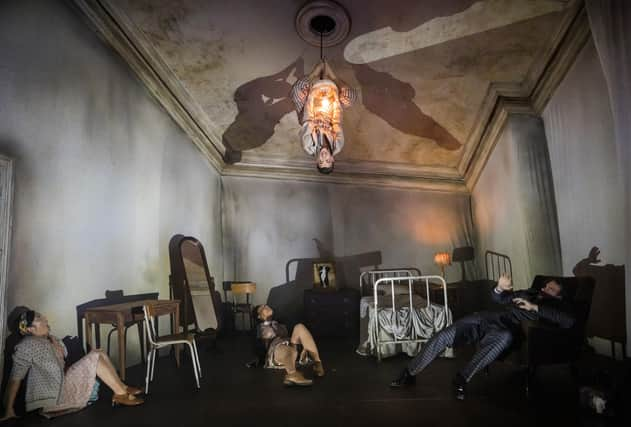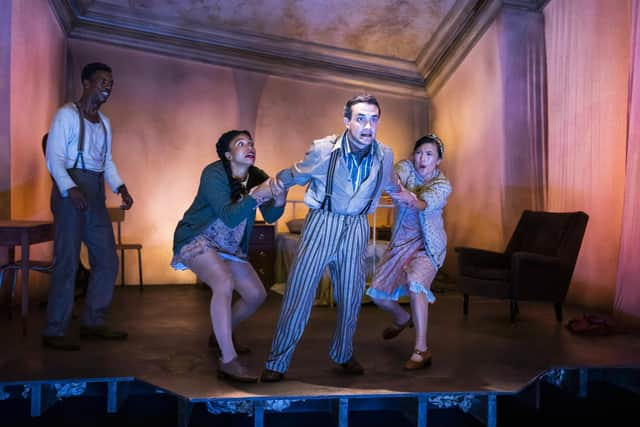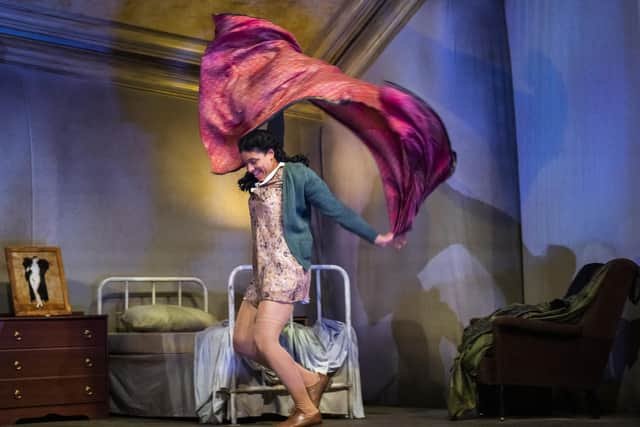Review: Metamorphosis makes for an unsettling but intriguing night at Coventry theatre


As Gregor Samsa awoke one morning from uneasy dreams he found himself transformed into – what, exactly?
It is a question that has long proved vexing for translators. Franz Kafka wrote the story in German, but it is not easy to interpret. “Monstrous vermin” is apparently the literal meaning, yet it is commonly assumed that poor Gregor has become a giant insect, something like a cockroach or a beetle. This is despite Kafka stipulating that no illustration be drawn for the tale; the implication is that he wanted the matter to be left to the reader.
Advertisement
Hide AdAdvertisement
Hide AdOne of the most striking aspects of this frequently striking production is that it provides no straightforward answer, at least to that question. Gregor remains recognisably human throughout. But he is a contorted and distorted kind of human, moving uncannily, hanging on the ceiling, dangling from the lightbulb. We hear his words; all his family hears is hideous noise.


But while Lemn Sissay’s adaptation is ambiguous about what has happened, it is clear about why it has happened. The pressures of rampant capitalism and the need to conform to conventional masculinity have made Gregor like this: his employers constantly demand more, his family constantly needs more; he is sustained by a lie, that he loves his job. Behind his smiley salesman patter lies utter terror. The story was first published in 1915, and has lost none of its relevance.
Few British theatre companies carry quite the cachet of Frantic Assembly. It is renowned for the breathtaking physicality of its work, which is somewhere between theatre and dance, bordering at times on magic; its actors move in ways that can seem impossible. Felipe Pacheco’s performance as Gregor drew frequent gasps of astonishment and disbelief from the audience; it sometimes looks genuinely dangerous in a way rarely seen in theatre.
The set feels part of all this too. We see a room elevated from the stage; we see it from its dilapidated floorboards to its shabby ceiling, via its dank walls. Its perspective is exaggerated and it occasionally shifts eerily. It seems to offer little sanctuary from the cruel world; if anything, it intensifies its toxicity. It is not a place one would ever want to be.
Advertisement
Hide AdAdvertisement
Hide AdWhich raises the question as to whether this is a production that one would ever want to see. It is unquestionably impressive: each character brings potency to their performance, with Hannah Sinclair Robinson subtly mesmerising as Gregor’s sister Grete and Loise May Newberry equally commanding and vulnerable as Mrs Samsa. It succeeds in conjuring an atmosphere that is deeply unnerving and unsettling throughout; it is like living in one of Gregor’s uneasy dreams, the repetitions in Sissay’s script suitably mad-making (one of its cleverest elements is its use of clichés and hackneyed expressions, as if the characters are trapped by language as much as anything else). There is music that is soothing at first but becomes disordered.


But the play takes about an hour to get to the start of the book; the arresting power of that first line is lost. So too is almost all the humour: this production fails to capture Kafka’s darkly comic absurdity. Frankly, some theatregoers may find the whole experience painful, and they could hardly be blamed for wanting something a bit brighter at this time of year.
There is however beauty amid all this, and it is worth persevering through the seemingly relentless misery to witness another metamorphosis, just as profound in its own way. Perhaps, Kafka seems to be saying, we need to wake from our own uneasy dreams and transform into – ourselves.
Metamorphosis, directed by Scott Graham, runs until Saturday January 27. Visit belgrade.co.uk to book.